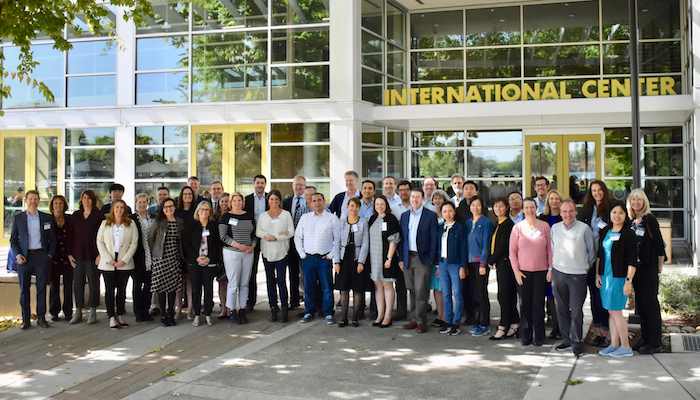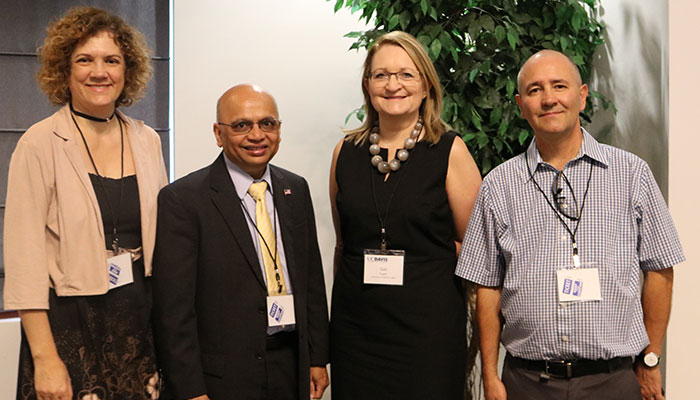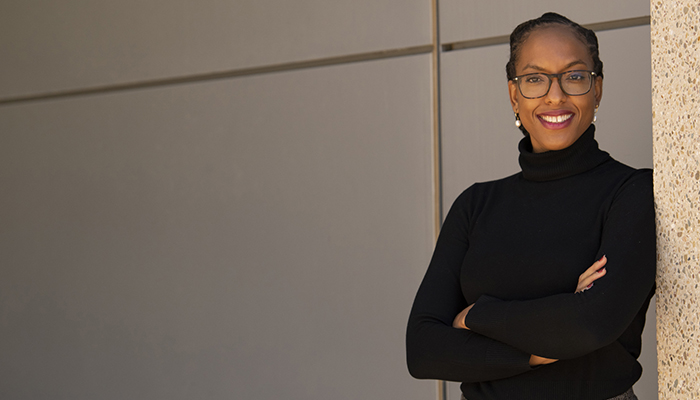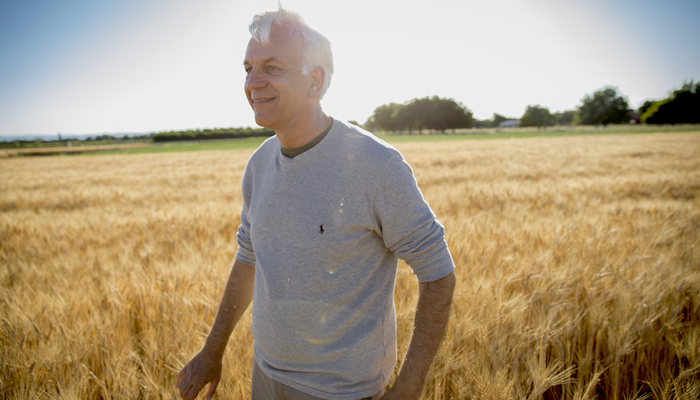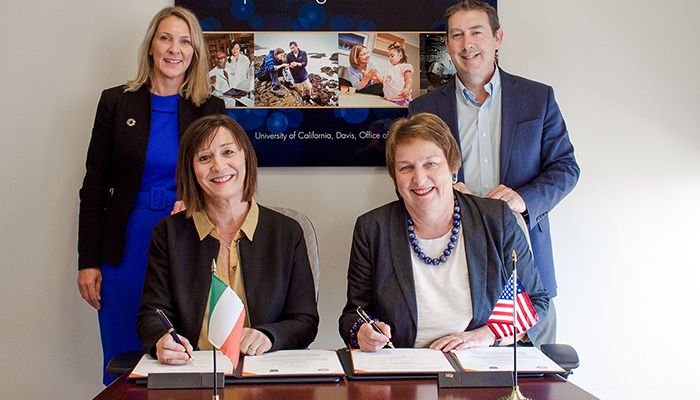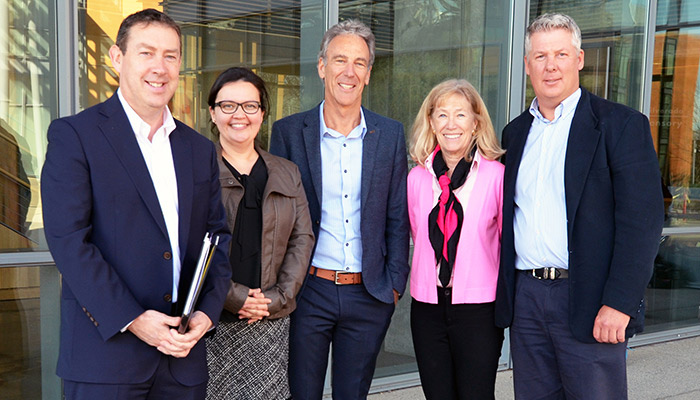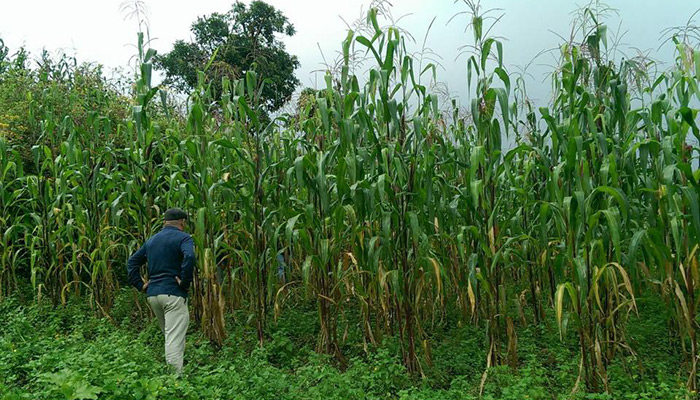UC Davis Hosts International Workshop to Tackle Global Food Challenges
By Lisa Howard
Researchers from eight countries and nine institutions gathered at the International Center at UC Davis on October 8 and 9 for a two-day workshop, “Food Security and Food Innovation.” The event, organized by UC Davis and the University of Sydney, was designed to strengthen existing partnerships and build upon complementary scientific expertise to address critical global challenges around food.
In his remarks, Paul Dodd, associate vice chancellor for Interdisciplinary Research and Strategic Initiatives at UC Davis, emphasized the hope of creating new research partnerships between the institutions. “UC Davis and University of Sydney convened this meeting to advance the global dialogue on innovative solutions to alleviate food security challenges,” said Dodd. “Given the myriad of stressors from climate change, to land use competition, to changing diets and health expectations, the path forward will clearly require close international collaboration. Based on the exciting scientific discussions here at Davis over the course of this workshop, it seems we are on the cusp of a new food revolution.”
Joanna Regulska, vice provost and associate chancellor for Global Affairs at UC Davis, addressed the group of about 60 participants, noting that, “global challenges around food cannot be solved by one university. These global partnerships will make a big difference.”
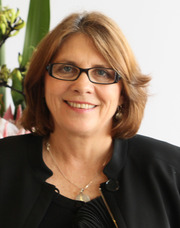
Robyn McConchie
Food research has been a strong area of collaboration between UC Davis and the University of Sydney. Robyn McConchie, a professor in the School of Life and Environmental Sciences at the University of Sydney, said that previous collaborations between the two universities over the past few years have resulted in 128 joint publications. “We are committed to multidisciplinary research. The aim of this workshop is to think big and think about what we can do collaboratively,” said McConchie.
In addition to researchers from UC Davis and the University of Sydney, other key partner institutions represented at the workshop included: Commonwealth Scientific and Industrial Research Organisation (CSIRO), Australia; University College Dublin, Ireland; Université de Montpellier, France; Pontificia Universidad Católica de Chile; University of Canterbury, New Zealand; University of Nottingham, United Kingdom; and University of São Paulo, Brazil.
Scientists from diverse disciplines shared evidence of how climate stress is already impacting global food production, making the need for additional research more urgent.
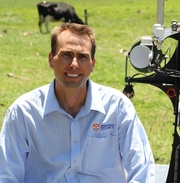
Cameron Clark
Cameron Clark, an associate professor at the University of Sydney, discussed working with the livestock industry in Australia to find ways to mitigate heat stress impacting cattle as temperatures continue to rise. He uses sensors that can track temperature and whether an animal is panting, which can indicate their level of heat stress. From that data, researchers can look for both short- and long-term solutions, such as developing systems that lessen heat stress and identifying favorable genetic traits to optimize heat tolerance in cattle.
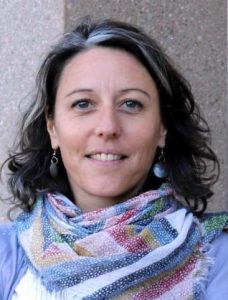
Amélie Gaudin
Amélie Gaudin, an assistant professor of agroecology at UC Davis discussed her research looking at how different agricultural strategies — such as crop rotation, cover crops and integrating livestock — can help build up resilience to stress. Gaudin also discussed the importance of emerging research on soil microbes in terms of plant resilience and the need for “optimizing the rhizosphere,” emphasizing the intersection between plants and the environment in the soil.
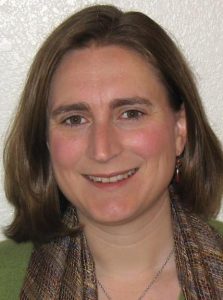
Christine P. Stewart
Nutrition experts discussed the challenges of feeding a growing global population. Christine Stewart, associate professor in the Department of Nutrition at UC Davis and interim director of the Institute for Global Nutrition, noted that “although famine has all but disappeared except in rare instances, undernutrition has again increased in the past two years, as has the prevalence of obesity, highlighting the need for a nutritious healthy food system in the face of a changing climate.” She also pointed out that 250 million children are estimated to be at risk of not fulfilling their developmental potential.
Other topics included: whether significantly decreasing food waste throughout the supply chain could be a strategy to feed the planet; the viability of turning agricultural waste into a sustainable energy source; whether countries could feed their populations without manufactured fertilizers; improving food storage; the significance of food on health; and land use and sustainable agriculture.
With faculty participating from schools and colleges across both Davis and Sacramento campuses, the workshop was organized and sponsored by Office of Research, working in close partnership with Office of Global Affairs and the World Food Center, and the College of Agriculture and Environmental Sciences.
Researchers who are interested in learning more about the research projects being developed around food security and food innovation, or who want to engage with international partners for research, can email at Ana Lucia Cordova-Kreylos at [email protected].
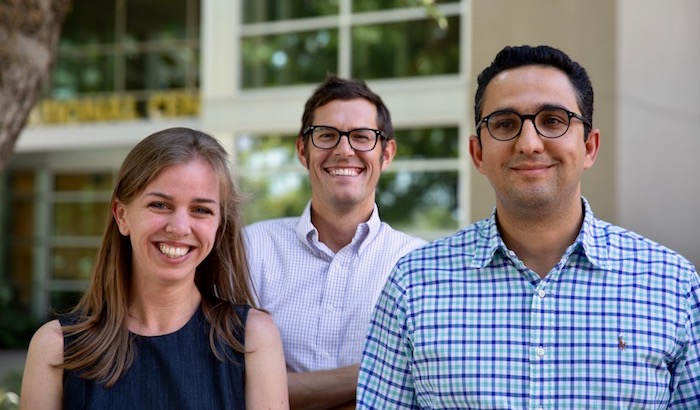
From left to right: Christine Diepenbrock, assistant professor, Department of Plant Sciences; Cameron M. Pittelkow, assistant professor, Department of Plant Sciences; and Payam Vahmani, assistant professor, Department of Animal Science, participated in the two-day workshop. (UC Davis photo)
Latest News & Events

